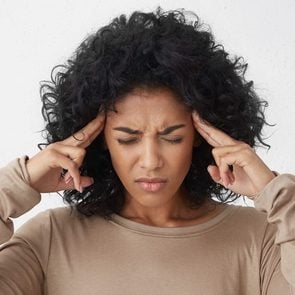6 Signs You’re Having a Stress-Related Migraine
Updated: Jun. 08, 2021
Stress can affect your body and mind—and it may set off a migraine. Here's how to tell if you're having a stress-related migraine.
Stress and migraines
Migraines aren’t what you’d consider an ordinary headache. They have a tendency to clobber you over the head with intense head pain and can cause other symptoms that range from disruptive to debilitating.
Sounds stressful, right? It sure it. But the relationship between migraines and stress is a two-way street.
Stress is one of the biggest triggers for migraine headaches.
What are migraines?
Far from “just a headache,” a migraine is believed to be a neurological disorder characterized by intense throbbing pain located at one or both sides of the head that can last anywhere from four to 72 hours, according to the National Institute of Neurological Disorders and Stroke.
The condition results from genetic, environmental, and lifestyle factors.
What also sets a migraine apart from a typical headache is that it comes with other symptoms, like nausea, vomiting, and a sensitivity to light, smell, and sound.
Many migraineurs also experience an aura, or neurological disturbances that precede head pain, such as seeing zigzag lines or flashes.
Certain auras can even be more concerning—say, if you have weakness on one side of your body, or other stroke-like symptoms.
What’s a stress migraine?
A stress migraine isn’t an official diagnosis. Rather, stress triggers the migraine process.
“For a long time, people would say that stress is causing the migraine, but we know that’s not the case. These people have migraine genetically independent of stress—though it is a contributor,” explains Chaouki K. Khoury, MD, a neurologist with Panda Neurology & Atlanta Headache Specialists.
Other migraine triggers include hormonal changes during menstruation, skipping a meal, getting less sleep than usual, certain foods and additives like aspartame, and various strong scents.
(Learn more about menstrual migraines.)
Here’s everything you need to know about the link between stress and migraines, including symptoms and prevention strategies.
Can stress cause migraines?
The hypothalamic-pituitary-adrenal (HPA) axis is made up of the hypothalamus (found in the brain), the pituitary gland (found at the base of the brain), and the adrenal glands (found on top of the kidneys).
Together, they play a role in how we react to stress.
When the stress hormone cortisol activates the HPA axis, it causes effects on serotonin, a neurotransmitter that plays a role in the development of migraines, says Mary O’Neal, MD, director of the women’s neurology program at Brigham and Women’s Hospital in Boston.
The unfairness of let down migraines
If stress can trigger a migraine, you’d think that recovering from a stressful week with a relaxing weekend would be just what the doctor ordered.
But there’s a phenomenon called a “let down migraine,” in which people get migraine attacks on the weekend. But the week’s stress is already over, so what gives?
While experts aren’t quite sure why this happens, says Dr. O’Neal, it is something that doctors regularly see.
“We know that, as a generalization, migraineurs tend to be successful people. There must be some reason why they can continue to be successful despite having a debilitating disease,” she says.
One theory: perhaps the migraine is being suppressed until it doesn’t need to be. When the stress is over, your body doesn’t see a need to hold back anymore. Like that, you’re left lying in bed all day on a Saturday.
Another theory has to do with changes to sleep routines and eating schedules, which can trigger a migraine regardless of stress.

Signs of a stress migraine
You know you’re stressed. That much is obvious, but is your migraine really induced by stress? Here are the symptoms to watch for:
Your muscles are tense
One physical symptom of a migraine: muscle tension.
“Neck and shoulder tension is common in migraine, but this does not make it a tension headache,” says Dr. Khoury. In fact, migraines are often misdiagnosed as tension headaches.
(This is the difference between a migraine and a headache.)
The head pain is intense
It can be tough to tell the difference between a tension headache and migraine.
Both tension headache and migraine can feature mild or moderate pain. But if your pain is more on the severe end of the spectrum, it’s more indicative of a migraine.
Migraine pain will also pound, throb, or be debilitating. The pain of a tension headache may be more distracting and uncomfortable.
Your mood has changed
If your mood shifts after your headache, there’s a good chance it was a migraine.
Following the attack stage of a migraine (that’s when pain happens) is the postdrome phase, also known as a migraine hangover. It can last hours or a day or two, and can cause changes in mood.
During this phase, you may feel depressed, irritable, or have trouble focusing.
You have migraine symptoms
If you have nausea, vomiting, dizziness or light-headedness, sensitivity to light or sound, muscle weakness, or vision changes, it’s most likely a migraine.
Head pain, another sign of a migraine, can go on for hours or even days if it’s not treated.
You’re really anxious
Stress and anxiety feed a migraine. But migraines also causes profound stress and anxiety, says Dr. Khoury.
“It becomes a forward-feeding loop. You can’t get out of the cycle and start spiraling,” he says.
Over time, this may lead to something called a chronic migraine, which is defined as having 15 or more headache days per month.
You’re a perfectionist
Overachievers are more likely to be migraineurs.
“Many are type A overachievers who were straight-A students,” Dr. Khoury says.
But the connection is complicated.
“In the past, we thought that because these patients are driven, that’s why they got migraines,” he says.
That is, maybe their overachieving ways led to more stress and, as a result, migraines.
“No,” says Dr. Khoury. “Genetically, they are more likely to be driven and have migraines.”
When to see a doctor
Get help sooner rather than later. The problem with stress as a trigger is that if you’re under constant stress, you’re more likely to get more migraines.
The more often you have to treat them with medications like over-the-counter (OTC) nonsteroidal anti-inflammatory drugs (NSAIDs), the more likely you are to deal with rebound headaches, which is pain that’s triggered by the medication itself.
“Migraine begets migraine,” says Dr. Khoury.
Intervene now before you reach the point of having chronic migraines, which can make treatment more challenging.
How to treat stress migraines
If you have migraines only
If you have migraines occasionally, a NSAID such as ibuprofen (Advil) or a prescription triptan may be recommended to stop them.
However, these shouldn’t be used more than nine days per month; taking them too often can cause rebound headaches, according to the American Migraine Foundation.
In that instance, your doctor may consider preventive medications.
If you have muscle tension or pain
A muscle relaxant may be an option for you. This can have an antimigraine effect, says Dr. Khoury.
“This type of medication works on the central nervous system to quiet down those nerves,” he says.
If you also have anxiety or depression
Ask about antianxiety medication, particularly a serotonin-norepinephrine reuptake inhibitor (SNRI), suggests Dr. O’Neal.
This type of medication targets serotonin pathways that can help decrease both anxiety and migraines, she says.
Antidepressants such as selective serotonin reuptake inhibitors (SSRIs) may also be used.
These work indirectly by addressing depression, which can have a beneficial effect on your mental health and stress levels, but they do not directly target migraines, explains Dr. O’Neal.
Prevention tips
So how can you stop stress migraines from happening?
The answer is at once both simple and difficult. You should try to address your stress and bring that level down by taking both small (and maybe life-changing) steps, if you can.
De-stress regularly
What makes you relaxed? Is it a massage? Yoga at home? Sitting down for 10 minutes alone and breathing?
These little stress-management moves add up in a big way to make you more resilient and counter the effect stress has on you.
Since migraine has a genetic component, others in your family may also get attacks. Dr. Khoury suggests finding things you like to do as a family that bring calm. Take after-dinner walks together or go hiking on the weekends, for example.
If you feel prodrome symptoms (that is, signs of an impending attack), taking time to relax may help prevent the migraine from progressing.
(Get quick stress relief in five seconds.)
Exercise
Exercise is one of the best ways to counter stress and improve your sleep, thereby addressing two triggers at once, says Dr. O’Neal.
According to a 2020 review in Current Pain and Headache Reports, aerobic exercise can significantly reduce migraine frequency, intensity, and duration.
It looks like higher-intensity exercise is best, but a low-impact activity like yoga is also likely beneficial, the researchers say.
Consider big life changes
Dr. Khoury has had patients who, after getting divorced or changing jobs, have seen their migraines drastically improve.
Some life changes—being able to change jobs, for example—aren’t doable for everyone. And rather than leave your current relationship if it’s a source of stress, you might consider couples counseling.
However, if you do feel like you have the ability to explore something else, be it a new company or career, take your migraine as the signal that you—for the sake of your health—need something new.
The bottom line: in order to address your stress migraines, you need to target the source of your stress.
Once you’ve identified the source, try some of these stress management tips to help you get started.



